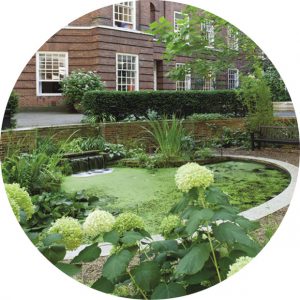One year on from mobilising the hard FM services contract for the BMA’s Grade II listed HQ building in London, Artic’s Marketing Manager Charlotte Pinder and BMA’s Head of UK Estates Ian Wade, discuss how the partnership is progressing
The British Medical Association (BMA)(i) is the trade union and professional body for doctors in the UK. Its Central London headquarters is at BMA House in Tavistock Square, a Grade II listed building designed by Sir Edwin Lutyens – arguably the greatest British architect of the twentieth century. As well as serving BMA staff and visitors, the building also accommodates staff from the British Medical Journal (BMJ). Alongside this, some of its spaces, which include a range of attractive meeting rooms, library and workspaces, a generous-sized courtyard and garden, are available to hire for events(ii).
Early in 2020, the British Medical Association went out to market with a tender for a full hard FM contract at Tavistock Square. BMA specified the contract winners must take a highly professional approach to service delivery and must be relied upon to maintain and extend the smooth operation of the building’s plant to ensure full compliance with all relevant UK legislation at all times. The tender process was also predicated on whether the contract winner could support the BMA to deliver a more sustainable future. The contractor needed to prove its ability to work in partnership with the BMA on energy saving initiatives in line with a range of energy management and environmental impact reduction strategies.
Artic Building Services(iii) was one of several companies to participate through the initial Invitation to tender stage and after two further shortlisted presentation stages, was finally awarded a five-year deal to deliver all the hard FM services. As part of the agreement, Artic proposed the delivery of mechanical and electrical services providing maintenance to SFG20(iv) guidelines, supplemented with other important items of specialist compliance maintenance, provided by a group of specialist partner companies. Under the terms of the contract Artic also provides three residential engineers to cover all PPM and reactive works which are managed and guided by a dedicated contract management and administration team.
ONE YEAR ON
Over a year on from contract go-live date, Artic’s Marketing Manager Charlotte Pinder and BMA’s Head of UK Estates Ian Wade met to discuss how the contract mobilisation process has progressed given all the additional challenges of the pandemic.
 “The contract was awarded just as the UK was taken into lockdown,” explains Pinder, “which of course had something of an effect on mobilisation.”
“The contract was awarded just as the UK was taken into lockdown,” explains Pinder, “which of course had something of an effect on mobilisation.”
Ian Wade explains: “As lockdown hit, we all had to adapt to very specific and limiting ways of working which could have been a hinderance or benefit to the successful mobilisation of our new contract. From the very first kick off meeting on site, the involvement of not only the mobilisation team, but also our appointed contract manager and administrator, along with Artic’s Joint MD instilled great confidence in the process for me and my team.
“With unoccupied buildings, in a way, some aspects of asset verification and knowledge were easier for Artic to establish but with my estates team generally working from home during this period, we also had to be confident that this ‘remote mobilisation’ was being carried out professionally and with due diligence. At all steps along the process Artic’s timely and accurate progress reporting confirmed that all milestones and thresholds were met … and I slept easy at night.”
Working under lockdown conditions, meant that being able to remotely track the mobilisation progress was even more important than usual. Artic introduced an innovative solution to help the BMA clients chart the mobilisation process.
Explains Wade: “Artic use a system called ‘Monday’ which is an online mobilisation portal. We chose to have ‘Viewers’ access so that I and my team could check and monitor progress at any time and in any place, even on our smart phones.
“In the first few days after the contract award we mutually agreed with Artic all the specific mobilisation tasks required within their specific priority and timeframe. We could then see all of these set into the ‘Monday system’ planner, and allocated to a named individual for action. The simplicity of the platform was ideal for us to monitor remotely the overall progress of the mobilisation plan itself. This system undoubtedly contributed a great deal to the smooth and seamless transfer of the contract from the previous incumbent over to Artic.”
ENGINEERING CHANGE
“Looking at the engineering side”, says Pinder, “the buildings here at BMA are intricate and substantial with a great variety of assets. This is why verification and condition were requisites of the tender, so there was a huge effort to go about understanding the BMA’s estates assets.”
According to Wade, the BMA facilities team was encouraged by Artic’s approach to the mobilisation process in this regard.
He explains: “They have a mobilisation engineering team separate from their everyday service engineers, and one which concentrates on the rather specific challenges of asset verification and checking. At every new contract award, we want to learn more about our own assets as they change and develop and I couldn’t recommend their Senior Mobilisation Engineer, John Tyler, more highly for his work.
“His highly proficient and accurate engineering work on our assets was coupled with a desire to really get ‘under the skin’ of our estate assets, understand them and take any relevant proactive measures in order to prepare the assets for contract commencement. Very quickly our confidence in their understanding of our assets and what steps could be taken to ensure a robust management plan for the future, grew.”






